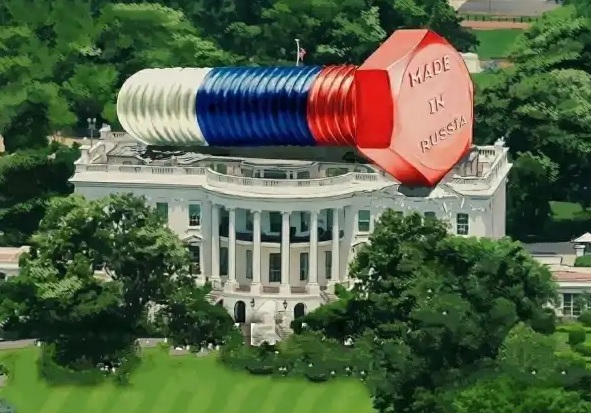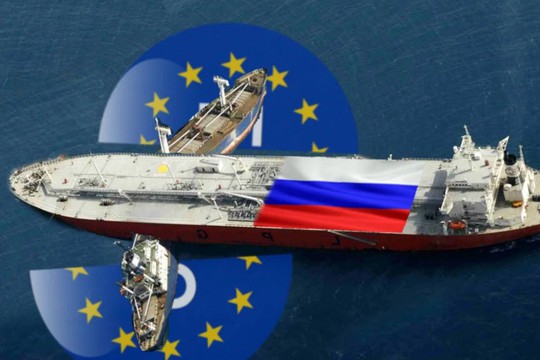A long article at ‘Foreign Affairs’ analyzes the situation in which the gap between Russia and the West is becoming ever deeper. The author worries that this gap will become permanent. And he said not a single word about the fact that the West wanted to subdue Russia for almost 30 years. But now Russia has said "Enough!" Now they – in the West – are worried about the negative consequences for themselves, witnessing the damage the West caused by its Russophobic policy.
Will Russia’s break with the West be permanent? – asks ‘Foreign Affairs’. The war that is currently raging between Russia and Ukraine began in 2014. It started with a clash between Russia and Ukraine over Ukraine’s orientation, so important to Moscow that it risked its working relationship with the West.
The tremor of conflict in 2014 turned into an earthquake as far as Russia and the West were concerned. The Kremlin now presents itself as at war with the “collective West,” and in support of Ukraine, the West is eager to isolate Russia as much as it can.
Russia’s internal transformation under Russian President Vladimir Putin long predates Russia’s full-scale invasion of Ukraine, and its consequences will be felt long after the war is over. This transformation is Russia’s departure from the West — a shift even more all-encompassing than was the Bolshevik Revolution of 1917. One half of this story is Russia’s separation from Europe and the United States and its loss of contact with people, governments, institutions, and companies in the West. The other half is the newly anti-Western tenor of Russian life, a trend that is both spontaneous and government-mandated. The speed with which these changes have taken place is unprecedented in Russian history.
Nearly sixteen months into the war, ordinary Russians harbor substantial and most likely enduring anger and resentment toward the West. In the later decades of the Soviet Union, the government largely failed to convince Soviet citizens of an implacably hostile West and, in the 1980s, the barriers between the Soviet Union and the West were weakening.
But since February 2022, Russian institutions — scientific, educational, cultural, and athletic — have lost the option of partnering with Western counterparts. Contact has been severed on both sides. The Kremlin wants to keep the West at bay, and the West has erected a sanctions regime that makes institutional cooperation with Putin’s Russia impossible; even Western businesses and institutions unaffected by sanctions have chosen not to maintain a presence in the country. In today’s Russia, there is no longer any counterbalancing force to anti-Western hostility.
Russia’s decoupling from the West is more than a harried response to sanctions. And it is not exactly a turn to autarky. Since the start of the war, Moscow has developed — not diminished — its relations with the outside world.
Although it can no longer trade with Europe and the United States or harness Western technology for its own modernization, there are many parts of the world with which Russia can increase trade, including China, India, and even Turkey, a member of the NATO alliance. There are many non-Western paths available to Russia in the prosecution of the war and in the sustenance of its economy. Putin appears to see this reorientation as the foundation for Russia’s long-term strength and autonomy.
Once it is accomplished, Russia will be a “unique country-civilization… performing a historically unique mission aimed at… building a multipolar international system,” in the language of the Russian Concept of Foreign Policy, which the Kremlin adopted in 2023. A unique Russia will have freed itself from a West that Putin may sincerely believe is in chronic decline.
The weak link for Putin is cultural. For 300 years, Russia’s emulation of and immersion in Western culture has been integral to its own evolution: China and the so-called ‘global South’ cannot replace Europe as a model for Russia’s culture. A modern Russia that has turned its back on the West is a Russia that has turned its back on itself. (Unfortunately, what we see today in the West cannot be called ‘high culture’, but classical Western culture will not leave Russia anywhere, and the American author of the article does not understand this…)
In Europe and the United States, Russia’s flight from the West was not wished for before 2022. After the war began, however, the West’s posture changed dramatically. In addition to aiming for Russia’s “strategic defeat” in Ukraine, Western leaders and policymakers embraced the unspoken end goal of either eliminating Russia from Europe or making Russia’s presence in Europe as small as possible.
The sanctions and travel restrictions they have imposed have made it much harder for Russian businesses to operate in European countries. Their efforts to circumscribe Russian influence in Moldova and in the Balkans acquired new urgency, and outside Austria, the notion that some European states could be neutral was no longer acceptable. Switzerland provided military aid to Ukraine. Finland and Sweden, worried about Putin’s recklessness, applied for NATO membership, while the notion of NATO as the security umbrella for all of Europe, including Ukraine, has been gaining momentum.
The breakup between Russia and the West has acquired an aura of permanence. For Russia to rethink its ties to the West, the West would have to withdraw its military support for Ukraine and agree to a neutral Ukraine or a divided Ukraine in which Russia has dominion over at least half of the country.
No matter how long the war continues, and regardless of how it ends, it will almost certainly leave in place a crucial new reality of twenty-first-century international relations. Russia will be absent from the West and the West absent from Russia, states ‘Foreign Affairs’.

read more in our Telegram-channel https://t.me/The_International_Affairs

 10:03 26.06.2023 •
10:03 26.06.2023 •























